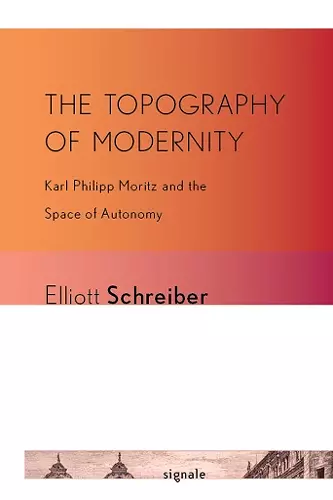The Topography of Modernity
Karl Philipp Moritz and the Space of Autonomy
Format:Paperback
Publisher:Cornell University Press
Published:15th Mar '13
Currently unavailable, and unfortunately no date known when it will be back
This paperback is available in another edition too:
- Hardback£116.00(9780801451782)

Karl Philipp Moritz (d. 1793) was one of the most innovative writers of the late Enlightenment in Germany. A novelist, travel writer, editor, and teacher he is probably best known today for his autobiographical novel Anton Reiser (1785–90) and for his treatises on aesthetics, foremost among them Über die bildende Nachahmung des Schönen (On the Formative Imitation of the Beautiful) (1788). In this treatise, Moritz develops the concept of aesthetic autonomy, which became widely known after Goethe included a lengthy excerpt of it in his own Italian Journey (1816–17). It was one of the foundational texts of Weimar classicism, and it became pivotal for the development of early Romanticism.
In The Topography of Modernity, Elliott Schreiber gives Moritz the credit he deserves as an important thinker beyond his contributions to aesthetic theory. Indeed, he sees Moritz as an incisive early observer and theorist of modernity. Considering a wide range of Moritz's work including his novels, his writings on mythology, prosody, and pedagogy, and his political philosophy and psychology, Schreiber shows how Moritz's thinking developed in response to the intellectual climate of the Enlightenment and paved the way for later social theorists to conceive of modern society as differentiated into multiple, competing value spheres.
Schreiber makes a compelling case that spatial metaphors inform Moritz's understanding of a series of institutions that are each caught up in processes of transformation in the late eighteenth century, and he makes an eloquent case for the modernity of Moritz's thought in these areas. This will prove to be an indispensable book, not just to students of Moritz, but more generally to students of the German eighteenth century, the Age of Goethe, and the European Enlightenment.
(The German Quarterly)Karl Philipp Mortiz's peculiar life story, his writing's apparent lack of systematicity, as well as the difficulty to categorize his work all contributed to the relative neglect (especially in the U.S.) of this important eighteenth-century thinker who made major contributions to the eighteenth-century knowledge base. Elliot Schreiber['s] erudite study offers the long-needed response to this neglect. It establishes Moritz as a central voice of Enlightenment who offers a distinctive (and skeptical) perspective on major tenets of his era and across various fields: aesthetics, pedagogy, pyschology, and political theory.
(Lessing YearbISBN: 9780801478086
Dimensions: 229mm x 152mm x 14mm
Weight: 454g
194 pages